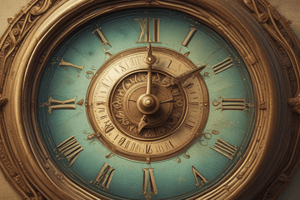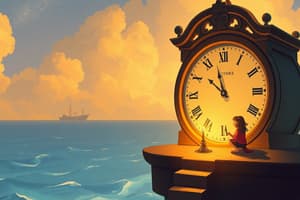Podcast
Questions and Answers
A movie starts at 7:15 PM and ends at 9:30 PM. How long is the movie?
A movie starts at 7:15 PM and ends at 9:30 PM. How long is the movie?
- 2 hours and 45 minutes
- 2 hours and 15 minutes (correct)
- 1 hour and 15 minutes
- 1 hour and 45 minutes
What time will it be 3 hours and 30 minutes after 10:00 AM?
What time will it be 3 hours and 30 minutes after 10:00 AM?
- 1:30 PM (correct)
- 1:00 PM
- 12:30 PM
- 2:00 PM
A baker has 37 chocolate chip cookies and 45 oatmeal cookies. If they sell 51 cookies in total, how many cookies are left?
A baker has 37 chocolate chip cookies and 45 oatmeal cookies. If they sell 51 cookies in total, how many cookies are left?
- 82 cookies
- 41 cookies
- 21 cookies
- 31 cookies (correct)
A farmer plants 28 apple trees and 34 pear trees. How many more pear trees than apple trees did the farmer plant?
A farmer plants 28 apple trees and 34 pear trees. How many more pear trees than apple trees did the farmer plant?
Which of the following inequalities is correct?
Which of the following inequalities is correct?
Emily has 125 marbles, and John has 152 marbles. Together, they give 50 marbles to their friend Sarah. How many marbles do Emily and John have combined now?
Emily has 125 marbles, and John has 152 marbles. Together, they give 50 marbles to their friend Sarah. How many marbles do Emily and John have combined now?
A train is scheduled to depart at 11:45 AM, but it is delayed by 50 minutes. What is the new departure time?
A train is scheduled to depart at 11:45 AM, but it is delayed by 50 minutes. What is the new departure time?
What is the sum of 47 and 35?
What is the sum of 47 and 35?
Flashcards
What is mathematics?
What is mathematics?
Deals with logic of shape, quantity, and arrangement.
What is telling time?
What is telling time?
Reading clocks, both analog and digital.
What do hands on a clock mean?
What do hands on a clock mean?
The shorter hand indicates the hour, longer indicates minutes.
What is a digital clock?
What is a digital clock?
Signup and view all the flashcards
What is two-digit addition?
What is two-digit addition?
Signup and view all the flashcards
What is two-digit subtraction?
What is two-digit subtraction?
Signup and view all the flashcards
What is comparing numbers?
What is comparing numbers?
Signup and view all the flashcards
How do you compare 3-digit numbers?
How do you compare 3-digit numbers?
Signup and view all the flashcards
Study Notes
- Mathematics is a fundamental science that deals with the logic of shape, quantity, and arrangement
- Telling time, addition, subtraction, comparing numbers and solving word problems are all vital math skills
- Proficiency in these areas builds a strong foundation for more advanced mathematical concepts
Telling Time
- Telling time involves understanding how to read and interpret clocks, both analog and digital
- An analog clock has two hands: a shorter hour hand and a longer minute hand
- The hour hand indicates the hour, while the minute hand indicates the minutes
- Each number on the clock represents an hour, and the space between each number represents 5 minutes
- A digital clock displays time using numbers, with the hours and minutes separated by a colon
- Understanding the concept of AM (ante meridiem) and PM (post meridiem) is crucial for specifying the time of day
Two-Digit Addition and Subtraction
- Two-digit addition involves adding numbers with two digits each
- Start by aligning the numbers vertically by place value (ones and tens)
- Add the digits in the ones place first
- If the sum is greater than 9, regroup (carry over) the tens digit to the tens place
- Then, add the digits in the tens place, including any regrouped digit
- Two-digit subtraction involves subtracting numbers with two digits each
- Align the numbers vertically by place value (ones and tens)
- Subtract the digits in the ones place first
- If the top digit in the ones place is smaller than the bottom digit, regroup (borrow) 10 from the tens place
- Then, subtract the digits in the tens place, remembering to account for any borrowed digit
Comparing Numbers Up to 3 Digits
- Comparing numbers involves determining which number is greater than, less than, or equal to another number
- When comparing numbers, start by looking at the digit with the highest place value (hundreds)
- If the digits in the hundreds place are different, the number with the larger digit is the greater number
- If the digits in the hundreds place are the same, move to the next place value (tens) and compare those digits
- If the digits in the tens place are different, the number with the larger digit is the greater number
- If the digits in the tens place are the same, move to the ones place and compare those digits
- Use the greater than (>), less than (<), and equal to (=) symbols to represent the relationship between numbers
Addition and Subtraction Word Problems
- Word problems present mathematical problems in a real-world context
- To solve addition word problems, identify the quantities to be combined and find their total sum
- To solve subtraction word problems, identify the starting quantity, the quantity being taken away, and find the remaining difference
- Read the word problem carefully to understand what is being asked
- Identify the key information and any relevant numbers
- Determine the appropriate operation (addition or subtraction) to use
- Set up the problem and solve it by performing the operation
- Write the answer with the correct units or label
- Check the answer to make sure it makes sense in the context of the problem
Studying That Suits You
Use AI to generate personalized quizzes and flashcards to suit your learning preferences.




